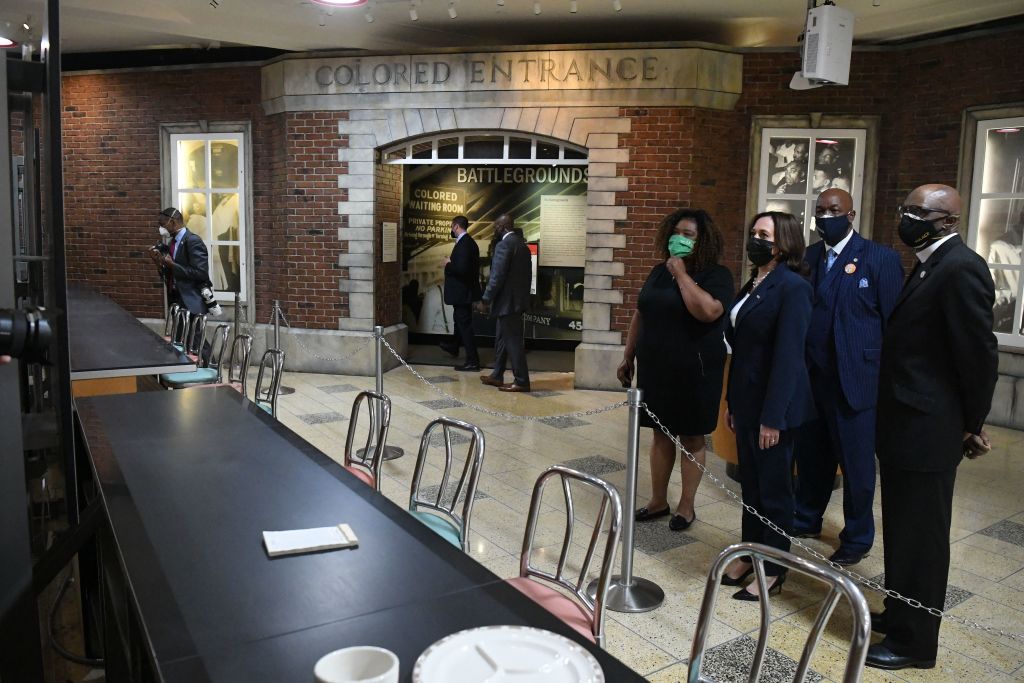Stay
UpdateD
Join the BPC
Email List
Stay up to date on exciting projects and upcoming events from the Black Promoters Collective.
Maj. Gen. Joseph McNeil, a key activist who led peaceful sit-ins that took place across the South, died Thursday morning. A press release published by his alma mater, North Carolina A&T University, confirmed the civil rights advocate passed away at the age of 83 on the morning of Sept. 4.
He was known as one of the “AT&T Four” protestors, which consisted of McNeil and his dormmates Jibreel Khazan (formerly Ezell Blair Jr.), Frank McCain and David Richmond. Khazan is now the last surviving member of the pioneers.
Rest in power, Maj. Gen. Joseph McNeil. As one of the Greensboro Four, you lit the spark for decades of nonviolent resistance. We promise to keep sitting, marching, and organizing—turning the seats you claimed into the foundation of a future no one can deny us. 🖤✊🏾 pic.twitter.com/FKBlNfTdAY
— Black Lives Matter (BLM) (@Blklivesmatter) September 5, 2025
RIP Joseph Alfred McNeil, major general in the United States Air Force & member of the Greensboro Four.
February 1, 1960, McNeil and three other NC A&T students sat down at a segregated Woolworth’s lunch counter in downtown Greensboro, NC – starting the Greensboro Sit-In’s. pic.twitter.com/XcCOYPyoKi
— Ave (@SebastianAvenue) September 4, 2025
McNeil initiated the planning that went into the widely recognized sit-in at Woolworth’s downtown location’s “whites-only” lunch counter on Feb. 1, 1960. When McNeil and his peers were refused service, they didn’t leave until the storefront closed. They returned multiple times to continue the protest style, eventually leading to a policy change that allowed them to be served nearly six months later.

“Joseph McNeil and his fellow North Carolina A&T classmates inspired a nation with their courageous, peaceful protest, powerfully embodying the idea that young people could change the world. His leadership and the example of the A&T Four continue to inspire our students today,” Chancellor James R. Martin II expressed in a statement via the news release. “The North Carolina A&T family mourns his passage, but celebrates his long and incredible life and the legacy he leaves behind.”
Although it wasn’t the first sit-in conducted, it gained traction with national media and inspired other students in the South to follow suit. McNeil, who was a 17-year-old college freshman at the time, was in the Reserve Officer Training Corps (ROTC) program while in undergrad. The techniques he learned from his courses and training provided him with the tools to strategize and organize effectively as he helped other scholars and citizens properly prepare and plan for sit-ins.
According to the news release, McNeil explained in a 2014 interview with WUNC FM that the public demonstration was about having free choice.
“The sit-in was not about David Richmond, Frank McCain, Ezell Blair or Joe McNeil sitting down and having a cup of coffee next to a white person,” he told the reporter. “It was much deeper than that. It was about choice. It was about having the ability to say, ‘I choose to sit down.’ Or, ‘I choose to drink from that water fountain.’ I don’t choose Black water or white water or colored water. I want water.”
McNeil was born in 1942 and experienced the effects of the Jim Crow era. Growing up in Wilmington, his determination to stand up for himself and his community served as a model for other efforts of the Civil Rights movement, which began in the 1950s and continued into the 1960s. Acts like this and others ultimately led to the passage of the Civil Rights Act of 1964.
After graduating from NC AT&T, the veteran joined the Air Force Reserves and retired as a two-star major general upon concluding his military career in 2001, ABC 11 reported. After hanging up the uniform, McNeil shifted gears into investment banking. Back in Wilmington, his legacy lives on with a historic marker along a street that now carries his name.
At this time, there aren’t any details on McNeil’s cause of death, but he’s being remembered by his family, friends, NC A&T and supporters for his audacious act to push back against racial segregation.
McNeil’s son, Joseph McNeil Jr., told ABC that his father’s “legacy is a testament to the power of courage and conviction.” He added that “his impact on the civil rights movement and his service to the nation will never be forgotten.”
Stay up to date on exciting projects and upcoming events from the Black Promoters Collective.

©2025 Black Promoters Collective (BPC) All Rights Reserved.